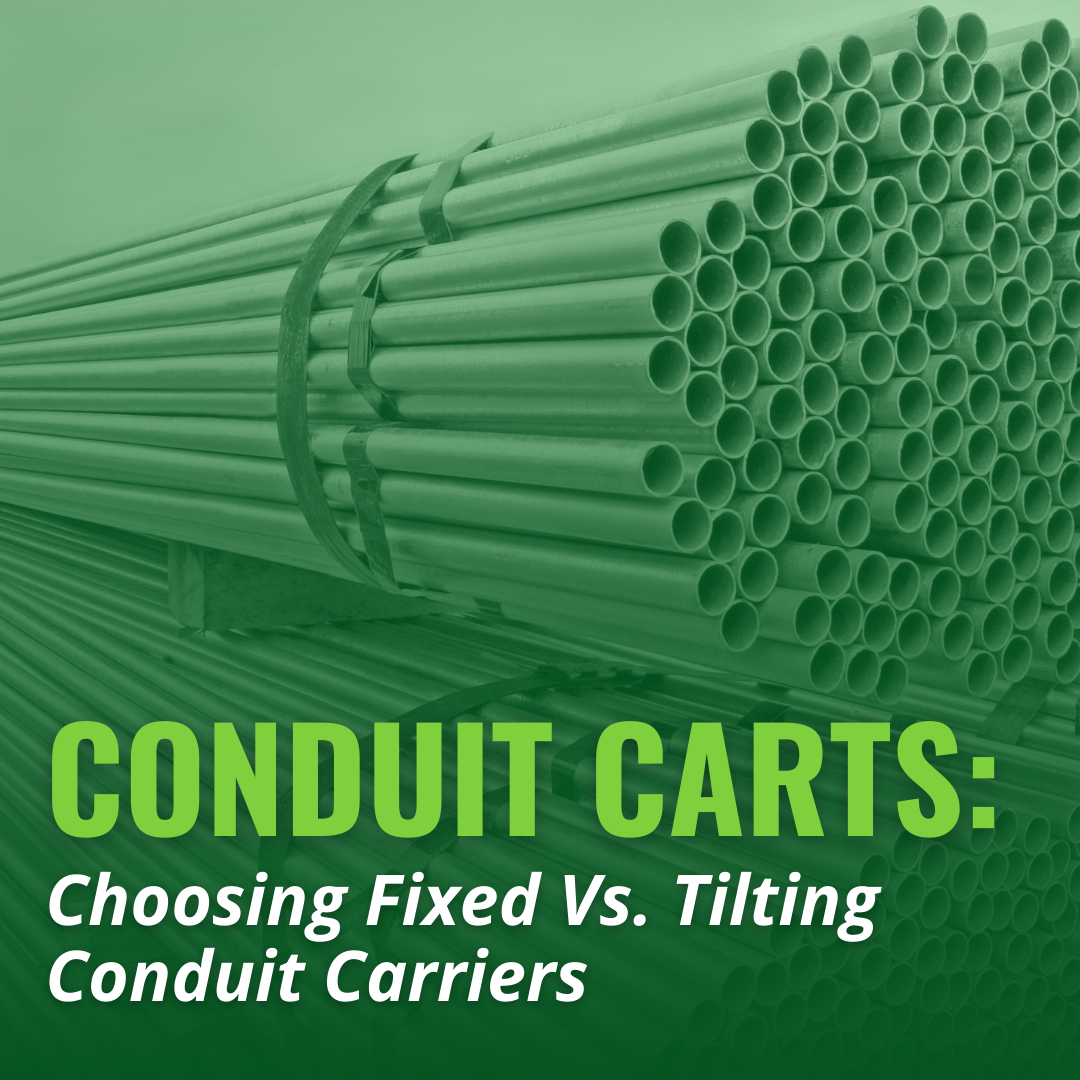We use cookies to make your experience better. To comply with the new e-Privacy directive, we need to ask for your consent to set the cookies. Learn more.
Conduit Carts: Choosing Fixed Vs. Tilting Conduit Carriers
Construction electricians may spend up to half the day simply moving materials. That’s according to a University of Michigan productivity report, which found that 40 to 50 percent of construction work time is spent on material handling. Conduit is certainly a big part of the challenge — especially when you work with rigid conduit, which typically comes in 10-foot lengths, and can get extremely heavy when bundled.

Specialized conduit carts provide a simple solution. With the right conduit cart, electricians can carry bulk loads of rigid conduit with them throughout the job site, simply reaching down for each new section. But conduit carts come in a variety of designs and specifications, and to get the greatest productivity gains from material equipment, you have to pick the right tool for the job. This article will help make that choice.
Types of Conduit Carts
Conduit carts generally follow one of three designs:
- Cantilever bar carts - This is essentially a cantilever-style conduit rack on wheels, which makes it simple to load and unload individual lengths of rigid conduit. These units frequently provide multiple levels of cantilever arms for greater capacity, which can complicate the loading of conduit bundles — and increase the risk of dropping product with a jolt or bump during travel. At the time of publication, Solus Group doesn’t stock cantilever conduit carts.
- Conduit cradle carts - These conduit and pipe carts feature rounded or right-angled load beds with high side barriers for stable product support. Open-top design makes them easy to load with slings or forklifts, while still providing instant access at the installation site. Solus Group offers two products with this design: The manual Conduit Carrier Cart, available with carrying capacities of 1,500 pounds, 3,000 pounds, or 5,000 pounds, depending on the model; and an extra heavy-duty Conduit Carrier Cart with a 6,000-pound capacity, moved via tuggers or forklifts.
- Conduit tilt carts - A tilting conduit cart features a swiveling open-top bed with a base plate. That provides similar functionality to a standard conduit cart, but with the option to move conduit into a vertically angled position to fit into narrower rooms and spaces — especially elevators. Solus Group offers the Tilting Elevator Conduit Cart, a conduit tilt cart that pivots loads 45 degrees, with a load capacity of 1,000 pounds.
![Tilting Elevator Conduit Cart [CC-ELV]](https://solusgrp.com/media/wysiwyg/Tilting_Elevator_Conduit_Cart.png)
Choosing Between Fixed and Tilting Conduit Carts
To pick the right style of conduit cart, start by answering one question: Does the jobsite feature spaces tighter than 10 feet (or an alternate maximum length of conduit)? If you can’t fit a full length of conduit into an area you need to access — whether that’s an elevator or simply a tight corner — the Tilting Elevator Conduit Cart is your best option. Because it shifts the lengthy load up to a 45-degree angle from the ground, it can move into smaller spaces than a fixed conduit cart.
However, this pivoting functionality comes at a cost: The Tilting Elevator Conduit Cart maxes out at 1,000 pounds per load. That’s sufficient for many installations, but if you’re transporting heavy-wall steel conduit or other bulkier products, you might need a fixed Conduit Carrier Cart with a higher capacity.
Finally, there’s the question of material handling equipment. Both Conduit Carrier Carts and Tilting Elevator Conduit Carts are built for manual movement, with a combination of fixed and swiveling phenolic casters. The 6,000-pound capacity Conduit Carrier Cart is fitted with fork pockets on one or both ends, depending on model, so it’s best used with a forklift — although casters are also available for tugging or repositioning with a single end elevated.
Still have questions about choosing the ideal conduit cart for your application? Contact Solus Group at 314-696-0200 today.
